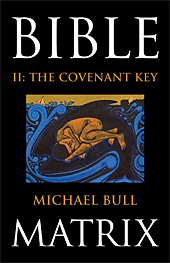Mar
1
2012
or Knife and Fire
From Bible Matrix II: The Covenant Key.
 James Jordan observes that the tools required for Adam to produce bread and wine in the Land were “Knife and Fire.” In God’s kitchen, Knife is Division (guarding cherubim), and Fire is Testing (purifying seraphim). The ascension of the Head allows the holy fire to descend upon the nearbringing sacrifice and raise up a fragrant Body of smoke from the Altar.
James Jordan observes that the tools required for Adam to produce bread and wine in the Land were “Knife and Fire.” In God’s kitchen, Knife is Division (guarding cherubim), and Fire is Testing (purifying seraphim). The ascension of the Head allows the holy fire to descend upon the nearbringing sacrifice and raise up a fragrant Body of smoke from the Altar.
Continue reading
10 comments | tags: Communion, Covenant Theology, Genesis, Totus Christus, Typology | posted in Bible Matrix
Feb
29
2012

Howbeit that was not first which is spiritual, but that which is natural; and afterward that which is spiritual. The first man is of the earth, earthy: the second man is the Lord from heaven. As is the earthy, such are they also that are earthy: and as is the heavenly, such are they also that are heavenly. And as we have borne the image of the earthy, we shall also bear the image of the heavenly. (1 Corinthians 15:46-49)
We’ve been talking about “intuition,” which is something ascribed more to women than to men. If we relate it to hermeneutics, does this mean women make better Bible interpreters, or is there something deeper going on?
Continue reading
2 comments | tags: Abel, Cain, Covenant curse, Covenant Theology, Eric Greene, Genesis, Hermeneutics, James Jordan, Liturgy, Paul, Resurrection, Revelation, Systematic typology | posted in Biblical Theology, Quotes
Feb
21
2012
or The New Jerusalem has a Moat

“I know your works: you are neither cold nor hot.
Would that you were either cold or hot!” (Revelation 3:15)
The world is a cosmic Tabernacle. The first domain of Mediatory Man was between the waters. The waters below (springs) were necessary for life but they were not “a place to live.” The waters above did likewise. However, these were temporary veils, boundaries to be crossed in an increasing advance-by-faith.
Continue reading
Comments Off | tags: Creation Week, Crystal Sea, Genesis, Laver, New Jerusalem, Noah, Revelation, Tabernacle, The flood | posted in Bible Matrix, Biblical Theology, Creation, The Last Days
Feb
14
2012

“Let this mind be in you which was also in Christ Jesus, who, being in the form of God, did not consider it robbery to be equal with God, but made Himself of no reputation, taking the form of a bondservant, and coming in the likeness of men. And being found in appearance as a man, He humbled Himself and became obedient to the point of death, even the death of the cross. Therefore God also has highly exalted Him and given Him the name which is above every name, that at the name of Jesus every knee should bow, of those in heaven, and of those on earth, and of those under the earth, and that every tongue should confess that Jesus Christ is Lord, to the glory of God the Father.” (Philippians 2:5-11)
This passage (or pericope?) retraces the Covenant pattern, which is also played out in the flow of the history of Israel. We’ll have a look at the structure of the passage and then I want to discuss the significance of the literary placement of “every tongue.”
WARNING: Weird ahead.
[This post has been refined and included in Sweet Counsel: Essays to Brighten the Eyes.]
Continue reading
2 comments | tags: Achan, AD70, Babel, Babylon, Circumcision, Covenant Theology, Evangelism, Genesis, Herod, Joshua, Moses, Pentecost, Philippians, Postmillennialism, Systematic typology, Tabernacle, Tongues | posted in Bible Matrix, Biblical Theology, The Last Days
Feb
8
2012
Atonement and Enthronement

“Jesus does what no medicine man
or witch doctor is able to do.”
And they came to Jesus and saw the demon-possessed man,
the one who had had the legion, sitting there,
clothed and in his right mind, and they were afraid. – Mark 5:15
Rich Bledsoe’s old blog is a goldmine. Here’s an excerpt from The Dysfunctional Family of the Gadarene Madman.
Continue reading
Comments Off | tags: Abel, AD70, Atonement, Cain, Circumcision, Edwin Friedman, Feasts, Genesis, James Jordan, Job, Matthew, Rene Girard, Revelation, Rich Bledsoe | posted in Biblical Theology, Quotes, The Last Days
Feb
3
2012
or The Invention of non-Adamites

“But your dad will not
know about that,”
Said the cat.
“He will never find out,”
Laughed the Cat in the Hat.
A popular argument among theistic evolutionists and hyperpreterists (and theistic evolutionary hyperpreterists) is that Adam wasn’t the first actual man, just the first man “in Covenant” with God. [1]
Continue reading
Comments Off | tags: Against Hyperpreterism, Compromise, Covenant curse, Covenant Theology, Genesis, Noah, Theistic Evolution | posted in Biblical Theology, Creation
Dec
11
2011
“So David (Sabbath – Creation)
Continue reading
Comments Off | tags: Abel, Atonement, Cain, David, Feasts, Genesis, High Priest, Samuel | posted in Bible Matrix
Nov
28
2011
1 Peter 2:4-10 | Sermon Notes

Cut and Uncut Stones
4 As you come to him, the living Stone—rejected by humans but chosen by God and precious to him—
Peter’s use of the stone image should bring many Old Testament images to mind:
- the precious stones of Havilah, intended to be mined from the Land to glorify the sanctuary [1]
- the false stones of Babel (they had brick for stone)
- Jacob’s head on the altar stone, in a deep sleep
- Jacob’s raising of an altar stone in Bethel: “And this stone which I have set as a pillar shall be God’s house, and of all that You give me I will surely give a tenth to You.”
- Zipporah’s sharp stone of circumcision
- Moses enthroned on a stone at the defeat of Amalek
- Israel’s altars of stone (one stone for each tribe) at Sinai and Carmel
- The precious stones on the breastplate of the High Priest
- The tablets of stone carrying the ten words
- The stones of the “Levitical” house in the city filled with plague
- The stones of judgment, the ground itself as a witness executing transgressors outside the camp
- The black and white stones in the ephod
We have two types of stones: uncut stones (altar, judgment – the Law) and cut, or precious, stones (glory and riches – Grace).
Continue reading
1 comment | tags: Circumcision, Exodus, Ezekiel, Genesis, Havilah, Hebrews, High Priest, Peter, Satan, Sinai, Solomon, Tabernacle, Temple | posted in Bible Matrix, Biblical Theology
Nov
16
2011

Remy Wilkins recently proposed a thesis about serpents and dragons in the Bible. Is there a difference? Are the words interchangeable? And even if they aren’t, how are these animals–and the spiritual truths they were created to represent–related?
This post has been slain and resurrected for inclusion in my 2015 book of essays, Inquietude.
Continue reading
1 comment | tags: Dominion Theology, Genesis, Noah, Remy Wilkins, Revelation 20, Satan, Totus Christus, Totus Diabolus | posted in Against Hyperpreterism, Biblical Theology, Creation, Quotes, The Last Days
 James Jordan observes that the tools required for Adam to produce bread and wine in the Land were “Knife and Fire.” In God’s kitchen, Knife is Division (guarding cherubim), and Fire is Testing (purifying seraphim). The ascension of the Head allows the holy fire to descend upon the nearbringing sacrifice and raise up a fragrant Body of smoke from the Altar.
James Jordan observes that the tools required for Adam to produce bread and wine in the Land were “Knife and Fire.” In God’s kitchen, Knife is Division (guarding cherubim), and Fire is Testing (purifying seraphim). The ascension of the Head allows the holy fire to descend upon the nearbringing sacrifice and raise up a fragrant Body of smoke from the Altar.
































